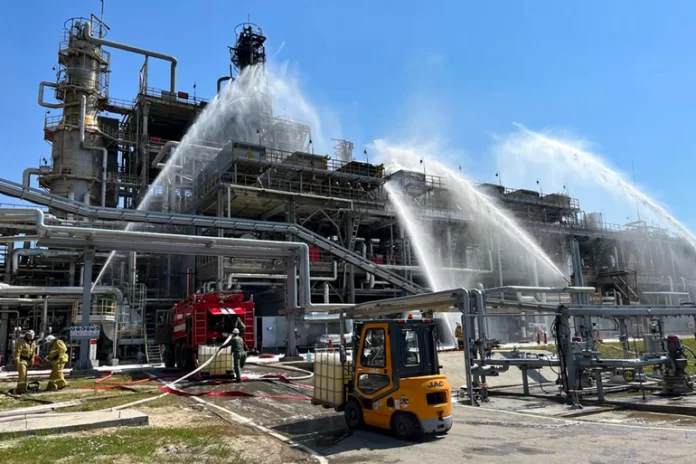A Russian oil refinery in the Rostov region was reportedly set ablaze after a Ukrainian-operated commercial class UAV drone, ladened with explosives, took a kamikaze dive into the plant. Recorded in this footage below captured by seemingly workers with a phone nearby the refinery. The video includes three videos stitched together, including firefighting efforts. Reportedly the fire has largely been put out. This attack is notable considering the depth of it within Russian lands and the way the strike was undertaken, 160km past the frontlines in Ukraine. Despite Russian air defense and electronic warfare anti-UAV systems, this drone seems to have slipped through a wide web of AD assets. Two attacks reportedly took place, the Novoshakhtinsk oil refinery in Russia’s Rostov region said the first drone struck at 8.40 a.m. (0540 GMT) hitting a crude distillation unit, triggering a blast and ball of fire. The second strike at 0623 GMT was aimed at crude oil reservoirs at the refinery, the largest supplier of oil products in southern Russia, but caused no fire, the plant said. No one was injured reportedly. Rostov’s regional governor, Vasily Golubev, said the oil refinery suspended operations.
?? ?? #NEW Footage of a #Ukrainian UAV loitering munitions kamikaze strike on a Russian oil refinery in Novoshakhtinsk, #Rostov Oblast. Close to 160km from the closest frontlines in Ukraine in #Donetsk Oblast. pic.twitter.com/IINX8SpuCn
— OurWarsToday (@ourwarstoday) June 22, 2022
Russian regions bordering Ukraine have reported numerous attacks and shelling following the invasion of Ukraine by Russian forces in February. This new form of drone warfare and UAV attacks could pose a new challenge for Russia to overcome, due to both the ease-of-cost and ease-of-access that Ukraine has to drone systems. Moreover, improvised UAVs and loitering munitions as well as standard militarized ones, pose a threat to Russian infrastructure due to the fact that they can sneak by AD systems that would usually intercept a missile, rocket, or artillery shell.
The refinery struck has an annual capacity of up to 7.5 million tonnes, and started operations in 2009. Russia’s energy ministry said the fire had not affected gasoline and diesel supplies to consumers in southern Russia.


